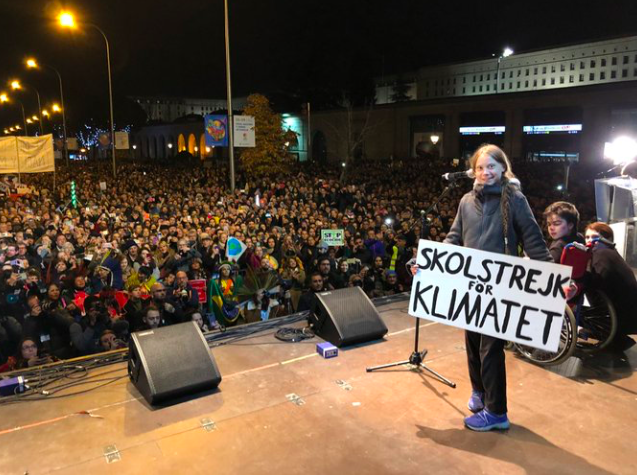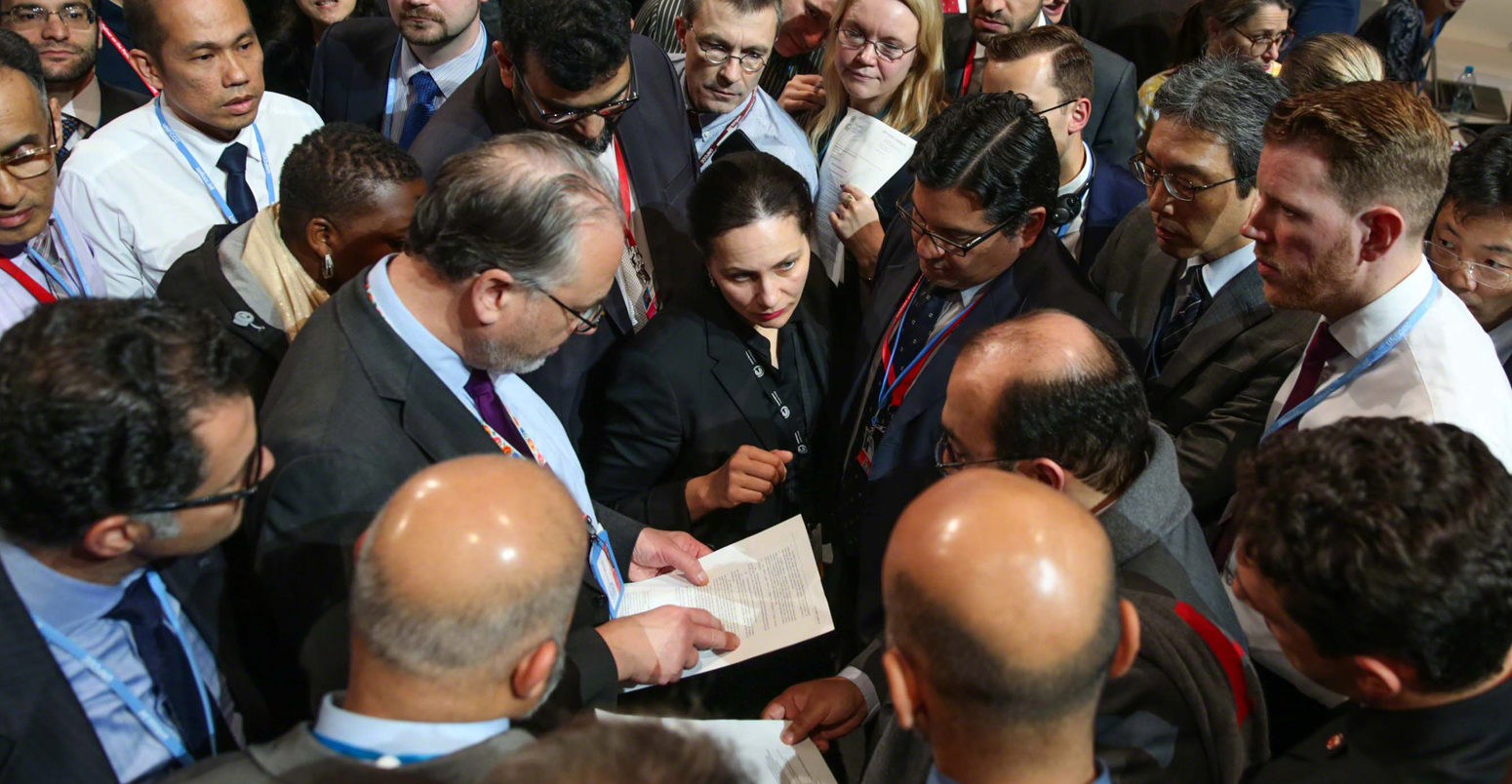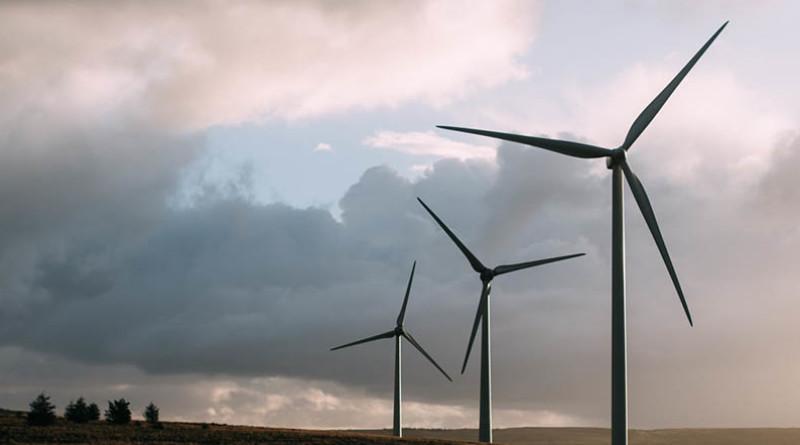 Fifteen young people co-signed a Dec. 10, 2019 letter to Prime Minister Justin Trudeau to block any new oil and gas projects and move quickly to phase out existing production. Photos compiled by Alastair Sharp via https://childrenvsclimatecrisis.org
Fifteen young people co-signed a Dec. 10, 2019 letter to Prime Minister Justin Trudeau to block any new oil and gas projects and move quickly to phase out existing production. Photos compiled by Alastair Sharp via https://childrenvsclimatecrisis.org
Swedish teenage climate activist Greta Thunberg and 14 other young people are calling on Canada to block any new oil and gas projects and move quickly to phase out existing production, saying that to do so would blaze a trail that other countries reliant on fossil fuel industries could follow.
The group of youth from across the world said Canada has taken a leading role globally in pushing for climate action, but must apply the same commitment domestically, in a letter addressed to Prime Minister Justin Trudeau and dated Dec. 10, Human Rights Day.
“Canada must apply its international climate leadership to all domestic action,” the letter says. “It must demonstrate how a major fossil fuels producer and exporter can transition away from these pollutants, blazing a trail for other fossil fuel-reliant economies to follow.”
They also wrote separately to Norway, another developed economy with a major and still-expanding oil and gas industry, with similar demands.
The group — which in September filed a complaint at the United Nations against Argentina, Brazil, France, Germany and Turkey — argues that climate inaction amounts to a violation of the rights of children, who will bear the brunt of the negative effects of a warming planet.
Trudeau has sought to align himself with Thunberg, who has galvanized the world’s young people to demand action on climate change after she started skipping school last year to protest outside the Swedish parliament. They met in September ahead of a massive climate march in Montreal, which they both took part in.
Canada is the world’s fourth-largest producer and exporter of oil, which mostly comes from the oil-rich province of Alberta and mostly goes to the United States. The combustion of oil and gas releases carbon and other gases into the atmosphere, creating a greenhouse effect that traps heat and is leading to more frequent and more extreme weather events and rising sea levels.
Trudeau’s government, which was re-elected with a minority in the October election despite strong opposition to its climate policies from Alberta and fellow oil and gas province Saskatchewan, has promised to achieve net-zero emissions by 2050.
The youth letter points out that to achieve that goal would require a block on all new projects.
Canada is currently considering an application from Teck Resources to develop the $20-billion, 260,000-barrel-per-day Frontier project abutting the Athabasca River in Alberta’s northeast, which, if approved, would be the first new open-pit petroleum-mining construction in the country’s oilpatch in many years. The government’s decision is due by the end of February.
Canada “must demonstrate how a major fossil fuels producer and exporter can transition away from these pollutants,” @GretaThunberg and other youth write in letter to @JustinTrudeau, calling for a block on all new oil and gas projects.
The letter also refers to other expansion activities, including the nearly complete 1,600-kilometre Line 3 pipeline between Alberta and Wisconsin, and the expansion of the Trans Mountain pipeline, which Ottawa bought last year and which, if built, would triple the capacity of that route from the oilsands to the British Columbia coast.
The Line 3 pipeline alone could boost Canada’s oil production by 10 per cent. Canada’s overall oil production is projected to expand by 60 per cent between 2017 and 2040, while gas production is set to expand by 34 per cent, they said.
Canada “must end the development and export of new oil and gas reserves, and set a plan to quickly phase out existing production fields,” says the letter, written by Michael Hausfeld, the youth group’s legal counsel. “It must stop prioritizing short-term economic gains over the future of its children and all children around the world.”
Four of the young people, represented by international law firm Hausfeld, come from the tiny Pacific island countries of the Marshall Islands and Palau, where rising sea levels risk inundating limited habitable lands, and where sources of freshwater used for growing food have already been infiltrated with salt.
The others come from countries across the world, namely Argentina, Brazil, France, Germany, India, Nigeria, South Africa, Tunisia and the United States.
The pressure from Thunberg and the others adds to Canada’s growing legal challenges regarding climate inaction, with a group of 15 young Canadians filing a domestic lawsuit against Ottawa in October, while a separate group in Ontario took the Doug Ford government to court last month.
The letter was also copied to Trudeau’s new environment minister, Jonathan Wilkinson; Canada’s ambassador to the United Nations, Marc-André Blanchard; and the United Nations Special Rapporteur on human rights and the environment, David Boyd.
It asked that Trudeau respond within two weeks. His office passed a request for comment to Wilkinson’s office, which said the government had made a lot of progress over the last four years, including $63 billion of investments in green infrastructure and clean energy, while acknowledging much more still needed to be done.
“Young people and Canadians across the country are counting on us for accelerated action on climate change,” Moira Kelly, a spokeswoman for Wilkinson, wrote in an email. “We hear them, and all of the Canadians who sent a clear message this election, that continuing to fight climate change needs to be a priority.”
She said the government was committed to hitting the net-zero target for 2050, which it plans to write into law, and to exceed its 2030 targets under the Paris Agreement. To help it do so the government is pledging to plant 2 billion trees and create a $5 billion fund to electrify parts of the economy including the resource and manufacturing industries.
“We know we need to make a transition to a cleaner economy and we know that this will not happen overnight,” she said. “We are committed to taking thoughtful solutions with Canadians to ensure that the clean economy is affordable for everyone.” SOURCE


 NDP MP Charlie Angus speaks in the House of Commons on Dec. 6, 2019.
NDP MP Charlie Angus speaks in the House of Commons on Dec. 6, 2019.  Fifteen young people co-signed a Dec. 10, 2019 letter to Prime Minister Justin Trudeau to block any new oil and gas projects and move quickly to phase out existing production. Photos compiled by Alastair Sharp via
Fifteen young people co-signed a Dec. 10, 2019 letter to Prime Minister Justin Trudeau to block any new oil and gas projects and move quickly to phase out existing production. Photos compiled by Alastair Sharp via 



 Karlyn Percil says she was laughed at by former colleagues for her accent, while also praised for being able to ‘speak well.’ She left a position in Toronto as a senior project manager in international banking and now is a motivational speaker. (Samantha Clarke)
Karlyn Percil says she was laughed at by former colleagues for her accent, while also praised for being able to ‘speak well.’ She left a position in Toronto as a senior project manager in international banking and now is a motivational speaker. (Samantha Clarke)
 Frans Timmermans in Milan, 24 May 2019. [Photo: EPA-EFE/DANIEL DAL ZENNARO]
Frans Timmermans in Milan, 24 May 2019. [Photo: EPA-EFE/DANIEL DAL ZENNARO]

 European Commission President Ursula von der Leyen reacts before the vote of Members of the European Parliament on her college of commissioners at the European Parliament in Strasbourg, France, 27 November 2019. [
European Commission President Ursula von der Leyen reacts before the vote of Members of the European Parliament on her college of commissioners at the European Parliament in Strasbourg, France, 27 November 2019. [
 Workers install a backlit billboard in downtown Toronto’s system of underground paths. Many specialist jobs will be little affected as the economy reduces carbon. (Don Pittis/CBC)
Workers install a backlit billboard in downtown Toronto’s system of underground paths. Many specialist jobs will be little affected as the economy reduces carbon. (Don Pittis/CBC) Most provinces will see a significant increase in construction jobs as carbon prices rise, says the pro-business Smart Prosperity Institute. (Smart Prosperity Institute)
Most provinces will see a significant increase in construction jobs as carbon prices rise, says the pro-business Smart Prosperity Institute. (Smart Prosperity Institute)